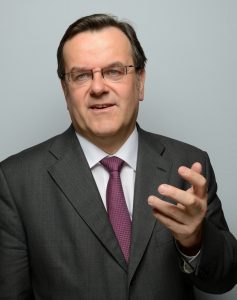 You have just been elected President of Efus. How important is this role for you?
You have just been elected President of Efus. How important is this role for you?
Willy Demeyer: Living a secure existence is a major need of citizens, whether in economic terms or regarding quality of life. In this sense, the feeling of well-being and of belonging to one’s city or neighbourhood is essential.
But this covers a wide range of fields for action for local authorities, and being able to exchange, compare or innovate along with other European cities is an asset. It makes it easier to improve and progress faster, for the benefit of cities’ residents and users.
How do you plan to fulfil your mandate? What direction will you give to the network, and what new areas of work will you explore?
Over the course of 20 years of local action, I garnered expertise in three areas in particular: culture as a lever for emancipation and belonging to the community; drug addiction seen through the prism of risk reduction, care, monitoring and support to families; security policies, in particular those related to terrorism (I am member of the Belgian Federal Committee on the terrorist attacks of 22 March), and policing with a focus on proximity and prevention.
I wish to take further advantage of the Forum’s experience on these topics, but I also expect that the presidency will allow me to tackle new dimensions, in particular with regards to the European Union and its various programmes.
The City of Liege has been member of Efus for over 20 years. As a locally elected official, what did this membership bring to Liege?
It enabled us to develop in a more comprehensive way our prevention and security policy. Exchanges among cities allowed us to learn, to widen the scope of our approach and make it more professional, all this in a very constructive and friendly atmosphere.
Do you think that national and European institutions now take better into account the role of the local and regional levels in preventing crime?
Indeed, following a long period of centralisation, we are going back, in many fields, to a much more local approach, closer to citizens, because they need to be able to draw the attention of and exchange with their elected officials on matters that are important for their daily lives.
Incivilities and petty urban crime weigh heavily on citizens’ feeling of security. The responses in terms of repression and redress must be grounded on the local level in order to bear fruit and avoid making citizens feel their demands are not met. The social cohesion of our cities is at stake.
The European Union is being contested as of late with Brexit and the rise of nationalism in several Member States. How to pursue the European project and cooperation?
In the face of nationalism and the temptation of extremes, it is necessary to strengthen the presence on the ground. For my part, I always try to approach problems in a pragmatic way, respectful of the dignity of people. I strongly believe in dialogue and respect for one’s interlocutor.
The projects supported by the European Commission are an opportunity to bring Europe closer to citizens and the reality of their daily lives. When they see the results of these projects, whether social (Secu-Cities, Goal, Liaise…) or focused on infrastructure (Feder), the wealth of resource-pooling becomes more apparent.
The co-production of urban security policies is the central theme of Efus’ sixth international conference, “Security, Democracy & Cities”, which will be held on 15-17 November in Barcelona. Why is this theme important?
Given the restructuring of public spending in all European countries, it is more urgent than ever that States think forward, with a democratic vision, on how to better allocate available personnel and resources for crime prevention and security.
Co-production is a pragmatic response to these challenges, while at the same time allowing to reflect on the necessary professionalization of surveillance and prevention.
I expect a lot from this conference, which will enable us to exchange new ideas and practices. European countries do not all approach these problems in the same way, so exchanging it is very rewarding.
Efus celebrates its 30th anniversary in 2017. What memories stand out for you?
My first thought goes obviously to Gilbert Bonnemaison, who was a true pioneer, especially for me at the time, as a young elected official. He managed to bring to the local level this idea of prevention and collaboration. Thanks to his action, a great number of cities removed internal barriers and thus improved public action on matters that had been ignored up until then.
The Naples conference, in 2000, was also a major event, with the first European manifesto, from which lessons can be drawn to this date.
Other important memories are our exchanges around the Football World Cup and Euro tournaments.
Also, I had the immense joy of working with Michel Marcus. His oratory talent and his vision of security and freedom in Europe have often inspired me in my work in Liege.
It is thus with pleasure and great honour that I accepted to submit Liege’s candidacy for the presidency of Efus.
It will be an opportunity for further learning at a time when the challenges facing our cities and metropolises require special attention from public authorities.



